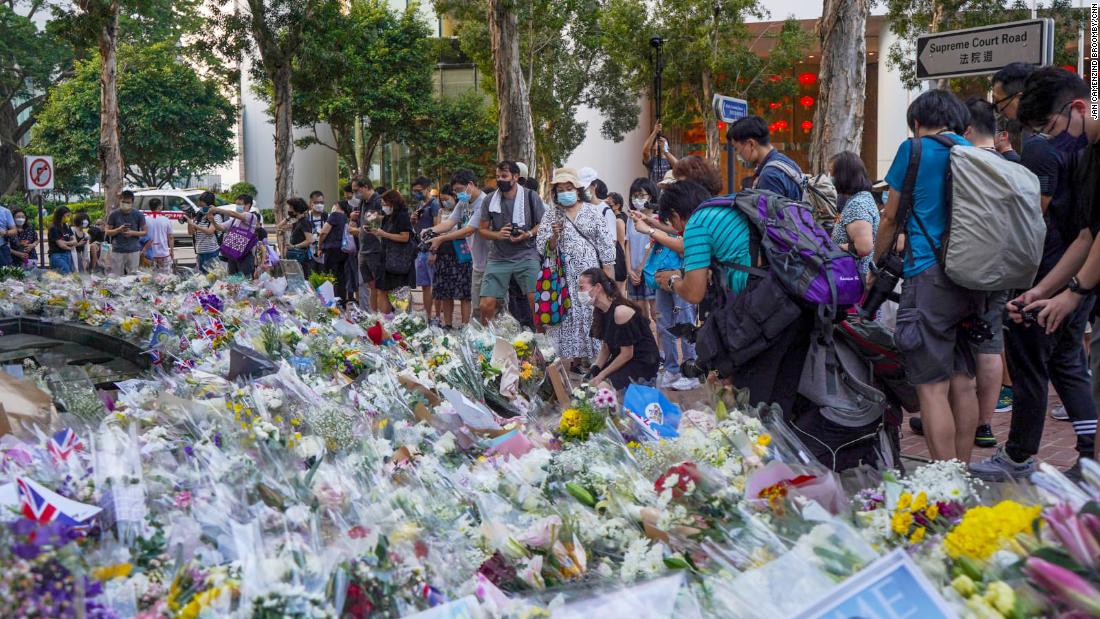 Crowds of more than 2,500 people of varying ages lined up for hours outside the British consulate Monday, enduring sweltering temperatures of 33 degrees Celsius (91 Fahrenheit), to leave flowers, framed photographs and messages thanking the "boss lady" or "lady in charge" -- as she was often known in Cantonese during the colonial years.
For some of them, this was not only a matter of mourning a monarch who had ruled over the city for 45 years, but a subtle form of protest at how China has tightened its grip on a once free-wheeling and boisterous city that critics contest has seen its civil liberties steadily eroded since the British handed sovereignty to Beijing 25 years ago.
Crowds of more than 2,500 people of varying ages lined up for hours outside the British consulate Monday, enduring sweltering temperatures of 33 degrees Celsius (91 Fahrenheit), to leave flowers, framed photographs and messages thanking the "boss lady" or "lady in charge" -- as she was often known in Cantonese during the colonial years.
For some of them, this was not only a matter of mourning a monarch who had ruled over the city for 45 years, but a subtle form of protest at how China has tightened its grip on a once free-wheeling and boisterous city that critics contest has seen its civil liberties steadily eroded since the British handed sovereignty to Beijing 25 years ago.
A symbol of protest - and a complicated past
On the surface, mourning the Queen might not seem confrontational -- especially given both Chinese leader Xi Jinping and Hong Kong's Chief Executive John Lee (a former police officer who started his career with the Royal Hong Kong Police Force in 1977) have sent their condolences" to the United Kingdom. But the displays of affection are also a reminder of the city's pro-democracy protests, during which demonstrators adopted the colonial flag as a sign of resistance to Chinese one-party rule. At the height of the 2019 protests, anti-government demonstrators broke into the city's legislative chamber, defacing it with graffiti calling for universal suffrage while hanging the colonial flag on the council president's seat.Britain's ties to Hong Kong stretch back to the 19th century, when the empire's desire to force opium on China -- both in trade and through its population's addiction to the illicit drug-- resulted in two wars that forced China to cede land to the British. Britain ruled Hong Kong for 156 years until it was handed back to China in 1997 as part of a longstanding agreement, but signs of British influence remain in the city's English street names and use of the common law system. Queen Elizabeth herself visited Hong Kong twice while the city was a British territory, while her son, now King Charles III, attended the handover ceremony.
In the wake of the protests, the British colonial government introduced a series of welfare reforms, including public housing programs and compulsory free education. But critics of the colonial era point out that even under British rule Hong Kongers did not have universal suffrage. And many felt London neglected its duty by failing to grant British citizenship to Hong Kongers at the time of the handover, instead offering most a limited passport that did not give them the right to live and work in Britain. Since the introduction of the national security law, Britain has created what it calls a path to citizenship via a new type of visa. "It was (the Queen's) empire that, in 1997, handed us over to China against our wishes," said Jeffrey Ngo, a Washington-based activist who was born during the last few years of colonial Hong Kong.
Ngo said he was too young to remember life under British rule but said older generations of Hong Kongers look back on Queen Elizabeth II's reign -- especially her 1975 and 1986 visits -- with tremendous fondness "because they associate that with a freer, simpler, happier bygone era." "The feeling is understandable, given that the intuitive point of comparison is Hong Kong under Chinese rule. I respect their lived experience, albeit it's not something I share. For me, the monarchy's wealth and prestige are impossible to disentangle from the empire's violence and expansionism," he said.
Ngo said the draconian laws being used by Beijing to prosecute pro-democracy activists today -- such as colonial era legislation on sedition -- were reminders that there was a darker side to Britain's legacy too.
CNN's Jan Camenzind Broomby contributed reporting.
. by [author_name]
https://www.globalcourant.com/in-hong-kong-mourning-the-queen-has-another-purpose-defying-china/?feed_id=22952&_unique_id=6322d31c12d7f